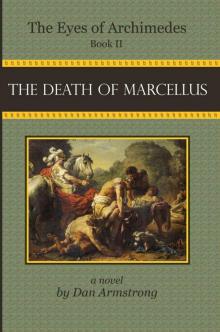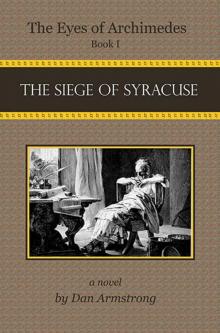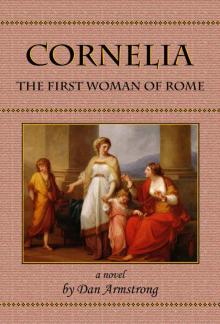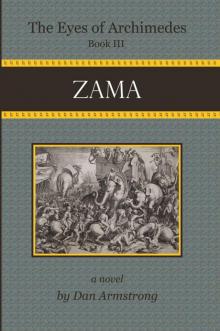- Home
- Dan Armstrong
The Death of Marcellus Page 3
The Death of Marcellus Read online
Page 3
Marcellus nodded. “It’s not something I’m looking forward to, Asellus.”
“Father, certainly you can’t mean that,” said Marcus. “You have a tremendous victory to present to the Senate. It should be a day of great honor and the granting of your third triumph. Not many Roman generals can boast of that. I believe Camillus had four.”
“Nothing is assured, Marcus,” replied Marcellus. “There’s a process to go through.”
“And not many senators will want to give your father the opportunity to boast of three triumphs,” said Publius, surely seeing the trouble that brooded on Marcellus’ brow. Publius was Marcellus’ lead client. While Marcellus was abroad, Publius kept abreast of politics in Rome, and with a team of other clients lobbied for issues important to Marcellus.
“There’s already talk of it among the senators,” continued Publius. “Your father is going to get some resistance. He’s become quite popular in the People’s Assembly. That always makes a certain portion of the Senate uneasy. Also the importance of taking Syracuse will be diminished by the recent fall of Capua. Some are calling it a significant turn in the war.” He reached awkwardly across the table to dip his cup in the bowl of mulsum. “Marcellus, I take it you heard that Hannibal’s army was outside Rome a week ago?”
Marcellus nodded. “As a diversion.”
“Fabius saw through it immediately. He’s riding high now. Whatever you might want in the coming year, it will have to go through him.”
Marcellus’ face registered no change in expression. He seemed to know much of this already.
“Fortunately Fabius realizes that his delaying tactics must come to an end, and that it’s time we went after Hannibal. I’ve even heard him say you’re the best man for the job—though he might not admit that to you.” Publius laughed derisively. “Tomorrow you will be tested. They’ll refuse the triumph and offer you an ovation—just to see how you react.”
“You already know that?” asked Marcus.
“The old patrician families don’t want a plebeian to become too popular, Marcus. Even one as wealthy as your father. They want to make sure he knows his place.”
“Publius is right, Marcus,” said Marcellus with little emotion. “I have a few friends in the Senate, but I have learned to expect nothing from the others.”
“It’s all petty jealousy.” Poised and articulate, Portia presented herself in the same stoic manner as her husband, but she was also quite capable of surprising candor and emotion. “Those old men could only hope to have the list of accomplishments that decorate your career. And the class difference just adds to their envy. If even half of what Marcus has told us is true, you will get your triumph.”
“Not if Fabius is against it, Portia,” said Publius. “Everything goes through the Fabian faction these days. And Marcellus has done himself no favors with his open disdain for the priesthood. Licinius became pontifex maximus while you were in Sicily, Marcellus—and he has it out for you. Be sure of that.”
Marcellus seemed unperturbed. “Damn the priesthood.” I noticed Portia shoot a glance at Marcus. “What I care about is winning the war. With Capua regained, and Syracuse ours as well, we’ve gained the edge. Triumph or ovation, all I want is a chance to chase down Hannibal. That’s why I have recruited my friend, Asellus.” He looked at the decurion. “If we’re going to defeat Hannibal, we’ll need a cavalry to match his.”
Asellus took a deep swallow from his cup of wine. “What Publius has said is worth noting, General. Fabius, despite his advanced years, controls both the College of Augurs and the Senate. There hasn’t been a more powerful man in Rome in my lifetime. Maybe we should find a way to work with him.”
Publius underlined this. “Our dear Warty”—I would later learn that Fabius had a prominent wart on his upper lip—“may have been appointed to a term as dictator six years ago, but he has remained a dictator in his actions ever since. One would think he’s conspired with the gods to turn every augur’s reading to his purpose.” Publius gave a drunken wink to Marcus. “And with the recent success at Capua, his defensive tactics are being called genius. Whatever you might want, Marcellus, Fabius will request some kind of concession in return—and maybe all it will take is your accepting an ovation with humility.”
Asellus stood from the couch to cut a piece of meat from the roasted boar. Before taking a bite, he surveyed the faces of the other men—as though Portia, Claudia, and I were not there. “I don’t much like the man, but he gets credit for holding Rome together when she threatened to come apart.”
Asellus was not a handsome man. The facial scars and carroubes didn’t help, but he was rough, straight-talking, and afraid of nothing. Two years earlier a Capuan by the name of Taurea, who had once been a highly regarded Roman cavalry officer before joining the Carthaginian cause, rode back and forth outside the Roman camp in Capua and challenged Asellus to a match in horsemanship. Asellus didn’t hesitate. The two men jousted outside the camp, as a game, to show off their skills. But Asellus grew tired of the meaningless sport and Taurea’s excessive confidence. He challenged Taurea to a duel to the death. The Capuan turned tail and never showed his face again.
Asellus took a big bite from the meat in his hand and followed it with all the wine that was left in his cup. The red mulsum ran from the corners of his mouth, and he spoke with a mouth full of food. “Fabius will be playing some game in the Senate tomorrow. We can trust in that. But in the end, no matter what successes we’ve had recently or how great a genius our elder senator is, until Hannibal leaves Italy or is defeated, we are at war. And that is no game at all.”
Marcellus’ eyes lit in reaction to his friend’s passion. He nodded to show his agreement. “I’ve had no greater disagreement with any other man. Fabius’ tactical defense runs counter to what runs in me.” He ground his left fist into the palm of his right hand. “Am I willing to accept an ovation instead of a triumph if it means a consulship in the spring?” He lowered his head and glowered at everyone around the table. “It’s something to ponder. But if Fabius truly accepts that the momentum of the war has changed, I think you’re right, Publius, he’ll give me the chance to chase down Hannibal—because despite all our differences, he does know that I, more than any other Roman, am up to the task.”
“Hear, hear,” said Asellus, lifting his cup in the air. Marcus and Publius echoed his sentiments and raised their cups.
“We’ll see what tomorrow brings,” stated Marcellus, also lifting his cup, even though it was empty.
CHAPTER 3
That evening I sat out in the peristyle with Marcus beneath a brilliant canopy of stars and a large waning moon. Although I had been in the Claudian home less than half a day, I already felt as though I were part of the family. To have been included in the dinner conversation, which had not been celebratory at all, but more an intimate discussion of Marcellus’ aspirations, meant I had been accepted into their inner circle. Because of my high admiration for both Marcus and his father, this meant a lot to me.
Marcus could be quick to anger and at times moody, but on this evening he was clearly happy to be home and to see his mother. The wine added to his good spirits. “I’m not sure if you know, Timon, but the only item from Syracuse that my father took for himself was Archimedes’ terrella. He showed it to me after we arrived in Ostia, demonstrating how it turned with the aid of the water wheel. It’s a curious device, but I struggle with what it suggests—that the Earth is round and that it travels around the sun. Can that truly be?”
“That’s how Archimedes described it to me, and his ideas were based on the work of several generations of Greek scholars.”
“It seems like such a strange thing to me. To say the Earth is moving when it seems as still as this column.” Marcus put his hand on the colonnade surrounding the peristyle. “Or that it’s round. There’s no suggestion of curvature when one stands on an open plain. We must be seeing a very small portion of the Earth if it’s truly spherical as you say.”
; “I find it difficult to believe also, but if we trust the geometry and the numbers, there are ways to prove that it’s moving around the sun and that it’s spherical.”
Marcus shook his head in wonder. “So you’re saying that I could travel completely around the Earth by simply heading east—and that I would arrive back where I started coming from the west?”
“That’s what some men have said.”
“Does anyone know how long a trip that would be? Is it a thousand miles? Five thousand?” Despite our differences in class and age, Marcus’ curiosity more than anything else allowed the two of us to be friends.
“One man,” I said, “did calculate the Earth’s circumference. He was a friend of Archimedes’, Eratosthenes of Alexandria. His method was remarkably clever. Archimedes explained it to me. It makes a good geometry lesson—if you’re in the mood for it?”
Marcus laughed. “Yes, of course, Timon, if you think I know enough to follow your argument.”
“Let’s find out.” I knelt beside an open patch in the garden where there was just enough moonlight to see lines drawn in the soil. “Eratosthenes had been told of a well in the city of Cyrene, where the Sun was so close to directly overhead at noon on the summer solstice that its reflection could be seen in the water at the bottom of the well. He imagined a perpendicular line drawn from the Sun to the bottom of the well.” I drew the Sun as a small circle and the Earth as a larger circle, then a line connecting them.
Marcus knelt beside me to inspect my drawing.
“Eratosthenes used a compass to measure the angle of a shadow cast by the sun at noon in Alexandria on the summer solstice. The angle was slightly more than seven degrees off perpendicular.” I drew a line that connected the Sun to where Alexandria would be on the larger circle. “Eratosthenes knew that Alexandria was due north of Cyrene five hundred Roman miles. With just the information I’ve told you, how could Eratosthenes have calculated the Earth’s circumference?”
“I have no idea.”
“There are three hundred and sixty degrees in a full circle. Correct?”
“Yes, I recall that.”
“And would you agree that seven degrees is very close to one fiftieth of three hundred and sixty degrees.”
Marcus nodded but didn’t seem to see where I was headed.
“From the difference in the angle of the sunlight, Eratosthenes concluded that the distance between Cyrene and Alexandria was one fiftieth of the way around the Earth. That meant five hundred miles was one fiftieth of the circumference. Five hundred miles taken fifty times equals twenty-five thousand miles.” I looked at Marcus. He nodded with some hesitation. “No one has ever measured this to verify his numbers,” I continued, “but Archimedes, at least, felt this method was geometrically correct and gave a good approximation of not only the circumference but also the radius of the Earth. If you recall, the circumference of a circle is two times the radius multiplied by twenty-two over seven. This means the Earth has a radius of about four thousand miles.”
Marcus studied my drawing for several moments, then looked up. “I need to think about this a little longer, Timon. I can’t even imagine such a distance—twenty-five thousand miles.”
“They say that Alexander of Macedon traveled four thousand miles to the east during his campaign to Asia. That would have been less than a sixth of the way around the world.”
Marcus shook his head, awed by the numbers and the ideas.
I smiled. “Any questions?”
Marcus faced me in the moonlight, suddenly serious. “Not about geometry, but something else. And it must be held in the strictest confidence.”
“Who do I know here besides you? Of course, you have my word.”
Marcus looked away, then spoke. “You must have heard my sister mention the name Sempronia at the dinner table.”
“I did.”
“Sempronia is to be my wife. The Sempronian name comes from a patrician family of long standing and wealth. The marriage will include a large dowry and a link to an important clan. The marriage was arranged several years ago by my mother and Sempronia’s mother Fulvia. My mother is very conscious of social standing and wealth. The marriage is something she wants very badly because it will connect our plebeian family to the Sempronii. The ceremony will take place in two years when Sempronia is fourteen.”
I nodded. Arranged marriages were common in both Rome and Greece. “Have you met her?”
“Only once when she was a child, but not in several years. They will deliberately keep us apart until just before the marriage.”
“What’s your concern?”
“What if I don’t like her? You heard Claudia this evening. She said Sempronia was fat and had pimples on her face.”
“Could Claudia have been teasing you?”
“Yes, but that doesn’t stop me from worrying about it. How could I ever hide my emotions if I thought she were ugly?”
“Maybe we should do a little research?” I grinned at him. “Do you know where she lives? Could we venture by her house and catch sight of her?”
“I don’t know where she lives, but I could find out.” Marcus pondered this a moment, then frowned. “Sneaking around would be improper, Timon. And what would I do if I simply couldn’t stand to look at her?”
“Die in battle?” I said in jest.
Instead of laughing, Marcus grew even more serious. “I have thought of that.”
“Come now, Marcus. Before you use fear of marriage to build your courage in battle, let’s get a look at her. Find out where she lives. Even if you think it’s wrong for you to seek her out, I could do it for you.”
Marcus peered skyward to the stars, then stroked his chin, clearly turning this over in his mind. Finally he looked at me, his face lit by the moon. “That could work. Are you really ready for this?”
I loved the man like a brother. I would do anything for him. “Yes, of course.”
“Then how might I repay you for this favor?”
My first thought was, what friend needs payment for a favor? Then I remembered my own predicament and the gravest issue in my life. I became as serious as Marcus had been. He could see it in my face.
“What is it, Timon?”
I started slowly. “When your father found me in Syracuse, I had been Archimedes’ slave for three years.”
Marcus nodded that he knew that.
“Prior to that I lived in Croton. I was my parents’ only child. When Carthaginian agents infiltrated our senate, my father spoke out against them. One night men came to our house to quiet him. He resisted and was murdered. My mother and I were kidnapped and sold to separate slave dealers. I ended up in Syracuse. From what little I’ve been able to find out, it seems my mother may have ended up here in Rome.” Talking about this brought tears to my eyes and a tremor to my voice. I bowed my head then looked up hopefully at Marcus. “Perhaps you could help me locate her—if she’s really here in Rome.”
Marcus smiled warmly. I was no longer his tutor, but a younger brother. “It will be far easier getting a peek at Sempronia than finding one person in a city of two hundred and fifty thousand.”
I recognized the truth of what he had said.
“But I’d enjoy the challenge,” he grinned. “If anyone can find her, I can. My family has connections and I know Rome inside out. I can learn things you could never discover on your own.”
I nodded as tears of gratitude began to roll down my cheeks.
“Think of it,” he said, a sparkle of moonlight in his right eye. “We can make a science of it.”
A smile leaked onto my face.
“We’ll use the geometry, Timon. We’ll map the city and mark it off in regular pieces. We’ll systematically go through every street and alley, and if she’s in Rome, we’ll find her.” He nodded his head, verifying his commitment to the project. “My time will be dear. I have work on the farm to do and lessons I must take to prepare for joining the College of Augurs. But we can call the mapmaking part of your job
as tutor.”
I lit up from the inside out. Just the idea of having Marcus help me filled me with hope. “Yes, Marcus, yes! We’ll start work on a map immediately. Our first task will be locating Sempronia’s home on it.”
CHAPTER 4
The son of a Greek father and an Etruscan mother, I spent the first seventeen years of my life living in Greek societies, in Croton as a youth, then in Syracuse as Archimedes’ slave. Going to Rome meant adjusting to another culture, a culture I would eventually live in for more than twenty years. During that time, I watched Roman society undergo a significant transformation, primarily an intellectual evolution, much of it due to the increasing influence of Greek thought in Roman life. Arguably this was the second-most important theme in Roman society during my lifetime. The first, in my opinion, was a deeper issue, the ongoing “conflict of the orders.”
The “orders” were the levels of Roman society or the social classes. At the top was the patrician order, the aristocracy. It consisted of about forty clans, ancestral groupings of Rome’s oldest and wealthiest families, the most prominent being the Fabii, Aemilii, Valerii, Manlii, Cornelii, and Sempronii.
A subset of the patricians, let’s say the aristocracy’s second tier, were the equites or the equestrian order, from which the Roman cavalry was drawn. Claudius Asellus was born to this order.
Below the equites were the plebs. The vast majority of Roman citizens, perhaps ninety-eight percent, were plebeian. As in the patrician order, there were also gradations. The wealthier plebeians, like Marcellus, owned large farms and were magistrates or senators or decorated military officers. In a sense, these wealthy plebeians were the third tier of the aristocracy and represented only a tiny portion of the plebeian class. Most of the plebeians owned small pieces of property but had little wealth. Many of them had no land and lived in the crowded tenements that filled a huge portion of the city.
Below the plebs were the freedmen like myself. Freedmen were not citizens and could not hold office, but we could own land and vote. At the bottom of the ladder, of course, were the slaves, who could not hold office, own land, or vote.

 The Death of Marcellus
The Death of Marcellus The Siege of Syracuse
The Siege of Syracuse Cornelia- the First Woman of Rome
Cornelia- the First Woman of Rome Zama
Zama